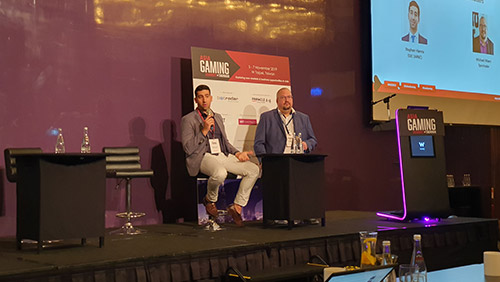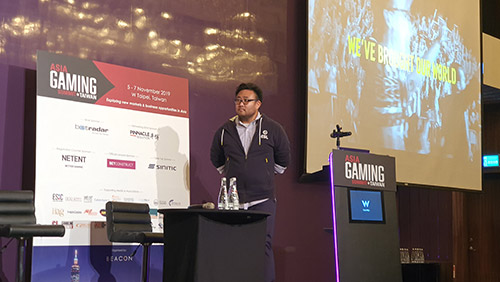The second day of the Asia Gaming Summit Taiwan largely focused on the next steps the gaming industry might want to start considering, particularly where it concerns technology and betting products offered. Attendees were eager to see how they can incorporate these ideas into their own plans.
The day began with a presentation from Eduard Castell of Integrity and Security Department representative from La Liga, who spoke about “Embracing wagering through responsible gambling and integrity.” He spoke about how the league has taken steps to discourage match fixing from every angle imaginable.
To lessen the importance of the financial incentive of match fixing, La Liga changed has forced teams to pay as much as they earn. As players are earning more, corruption becomes less likely. Teams also now earn from TV revenues based on their standings, so teams play harder until the end of the season.
Using Software La Liga, the league also monitors betting trends to catch match fixing as it happens. If they suspect something is amiss, they involve local authorities to investigate, and inform gambling operators so they can consider how this might have affected their books.

The conversation then turned to emerging technology, and Raymond Chan, Founder of Alphamirai inc, talked about how operators and Casinos can use new tech like Big Data, AI, IOT, Blockchain to attract and retain more players.
AlphaSlot believes that using these technologies, operators can increase time on device and provide systems of rewards for players using blockchain gateways. With new digital assets that follow the player home on their mobile device, casinos can keep in touch with them.
He opted not to speak too much on the topic of cryptocurrencies, specifically citing recent news out of China which has made it difficult to predict where the market will go next.
Turning to the customer service side of things, Curtis Matlock, CEO of Sinitec, spoke on “AI beyond customer support: personalizing player engagement to improve acquisition, retention, and reactivation.” The problem, as he put it, is that chatbots haven’t yet been purposed for iGaming, they’re too basic, and they’re English, and that’s a problem for Asian operators.
Sinitec is using machine learning and local universities to build a better bot. With chatbots that can be more naturalistic and better translated, operators can see higher conversion, lower churn and higher signups for promotions. Ultimately this means saving on live agents, a fast return on investment, and better profits.
Next up, Paul Jackson, Managing Director, Kroll, a division of Duff & Phelps, showed the scarier side of online operations with his topic “Under attack – understanding the value of data and why we are failing to prevent the attacks.” It’s a scary world out there, as criminals are finding better ways to steal data and money from operators.
From compromised business emails alone, businesses are losing $26 billion, he noted, but there are also threats from credential stuffing, usernames being resold, and ransomware.
To guard against this, companies need to start monitoring employees, he advised, to ensure they aren’t actively or accidentally creating vulnerabilities. Technology is part of the solution, but recruiting the entire organization to be an active part of the security apparatus is a better solution.
Harmen Brennikmeijer, Managing Director of Dynamic Parterns, once again hosted a panel, this time focused on “The Synergy between Brand Reputation, SEO and affiliate marketing. Panelists Bhavesh Parthi, Head of Affiliates for Asia Oppa Ltd. Dov Allin, MarketingCrossMedia.Asia, Erik Hellqvist, CMO of Wunderino all spoke about their experiences with managing the Asian affiliate scene.
A big issue in Asia is gaining the trust of affiliates, who don’t want to be known and are skittish about promoting online gambling. But with training, they can understand how to promote a brand in Asia.
Allin stressed that a good affiliate platform is vital, as it helps sites track performance and make better decisions. It also allows sites that have to change URL to avoid geoblocking to stay synced and get the traffic affiliates are sending them.
After the lunch break, the focus turned entirely to the growing market of esports, starting with Eric Jou, who’s focused on APAC Business Development & Partnerships with ESL Gaming. He spoke about “Southeast Asia – An emerging superpower in Esports.” Asia is already generating $1.2 billion in esports, he noted, and it’s growing fast. Mobile is driving this growth with games like Free Fire and League of Legends, and its providing an ever increasing audience that partners might want to take advantage of.

Next up was a panel hosted by Christina Thakor-Rankin, Principal Consultant at 1710 gaming, on “The true potential of Mobile Esports.” Joining her were Terrence Ting, CEO of Team Flash, Justin Widjaja, Founder of ONIC Esports, and Tyler Sycamore, Regional Manager for SEA & China Taiwan, Nico Partners. While most think about esports as something done on a computer or console, they noted that in Southeast Easia, mobile devices are king.
Ting noted that this is largely because mobile phones have a much more attractive entry price than a gaming desktop setup. Sycamore added that as Chinese phone manufacturers have helped bring down the price of smartphones, the market has grown by leaps and bounds. This matters to the potential betting market, Widjaja noted, because wherever we see competition, we want to bet on it.
Jason Fung, Senior Director of Global Esports at Alibaba Sports took the stage next to speak on “Content is King – choosing right and staying ahead of the game.” He emphasized how quickly the esports scene has grown, already rivaling traditional sports in viewership, but with a younger audience. And there’s room for growth. League of Legends tournaments now rival the NBA Finals in total viewers.
Turning back to a more sober look at the integrity of esports, Stephen Hanna, Director of Global Strategy and Partnerships of ESIC, delivered his talk “The Stakes are high: industry integrity, issues and countermeasures.” He noted ESIC seeks to aggregate efforts to promote integrity in esports.
They have a heavy focus on preventing cheating, but also have anti-doping measures. To help implement this sense of integrity, ESIC is building a framework for all of their partner tournaments, and working with local governments to implement regulations.
Finally, Mark Chew, Managing Director at Reddentes Sports, spoke about the media partnerships that are coming out of the esports scene. He noted that not all tournaments make the return on investment they expect right away and quietly fade away. But with the right partnerships, like Team Flash’s new sponsorship deal from VietJet, they can have a healthier outlook.






